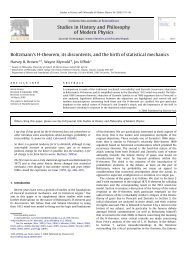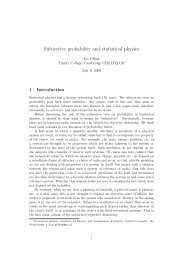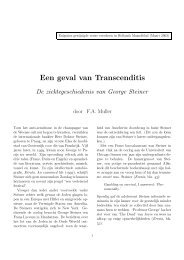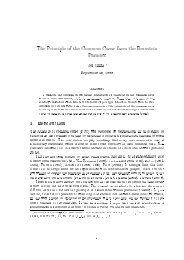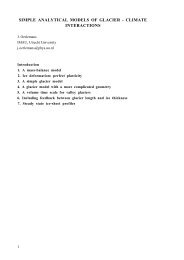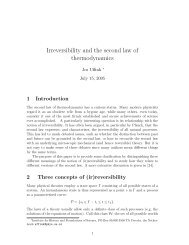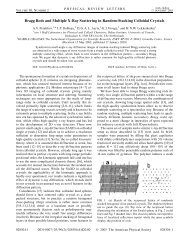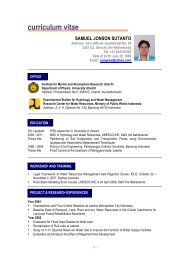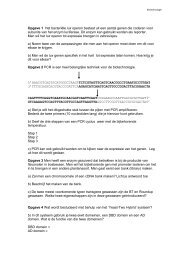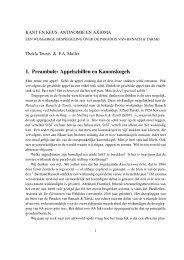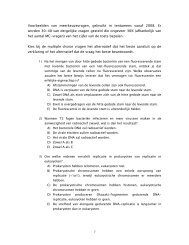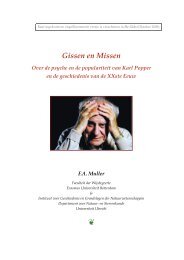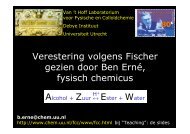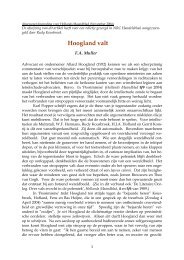FOUNDATIONS OF QUANTUM MECHANICS
FOUNDATIONS OF QUANTUM MECHANICS
FOUNDATIONS OF QUANTUM MECHANICS
Create successful ePaper yourself
Turn your PDF publications into a flip-book with our unique Google optimized e-Paper software.
86 CHAPTER IV. THE COPENHAGEN INTERPRETATION<br />
The meaning Bohr attaches to the uncertainty relations can be summarized this way: the sharper<br />
we can, in a phenomenon, define the position of the object, the fuzzier the momentum must be defined,<br />
and vice versa. The quantities δq and δp in the relation δqδp ∼ h therefore represent the fuzziness in<br />
the definition. Bohr emphasizes an epistemological role of these quantities stronger than an ontological<br />
role.<br />
IV. 2. 2<br />
REMARKS AND PROBLEMS<br />
Bohr’s supposition that classical language is a definite means of expression for physical observations<br />
which cannot be improved upon, is radical and at first sight even fairly unacceptable. Language<br />
develops and history teaches us that from time to time new concepts are necessary. Aristotle had,<br />
for example, no momentum concept, Newton knew nothing of energy, Coulomb had no theory of<br />
fields, etc. Doesn’t it speak for itself that quantum mechanics also asks for new concepts? Bohr,<br />
however, (ibid., p. 16), says<br />
[. . . ] it would be a misconception to believe that the difficulties of the atomic theory may<br />
be evaded by eventually replacing the concepts of classical physics by new conceptual<br />
forms.<br />
Bohr emphasizes that with this point of view he does not reject the introduction of new entities,<br />
e.g. quarks, superstrings or black holes. The aspects of classical language which are the reason<br />
that it cannot be improved upon are, according to him, descriptions in terms of space and time and<br />
descriptions in terms of cause and effect. These are the only categories with which we can describe<br />
observational results.<br />
Another problem with the idea that the classical concepts cannot be improved upon is Bohr’s<br />
immediate conclusion that the quantum of action cannot occur in the description of a phenomenon,<br />
because a statement such as ‘h = 6.6 · 10 −34 Js’ is also an unambiguous summary of experimental<br />
evidence, although not of one phenomenon. The idea that h cannot appear in the language of observations<br />
is a weak, and in fact untenable point in his argumentation. The prohibition of the use of h<br />
in the language of observations also brought Bohr to the conclusion that the spin of an electron, 1 2 ,<br />
would be fundamentally unobservable. This conclusion has been proven to be incorrect.<br />
In some articles Bohr gives a more abstract explanation of the quantum postulate and emphasizes<br />
the ‘symbolic’ role of h. It does not so much represent the inevitable interaction, or measurement<br />
disturbance, between object and measuring apparatus, as the fundamental impossibility to make a<br />
sharp distinction between object and observation apparatus. It is, in any case, clear that Bohr does not<br />
regard the formalism of quantum mechanics, with its wave functions and operators, as an extension<br />
or improvement of classical language. He emphasizes that this formalism is purely symbolic and<br />
cannot be taken as a description, as the quantum state of a system is given without reference to the<br />
experimental setup.<br />
It should be noted that Bohr, at emphasizing the applicability of concepts, has more in mind than<br />
the ‘logical’ question of ’definiteness’. For Bohr a term like ‘position of a particle’ is applicable if we<br />
can in fact control and secure this position, using firmly bolted apparatuses. Bohr’s use of the term<br />
‘determination’ refers both to a measurement as to a state preparation.



